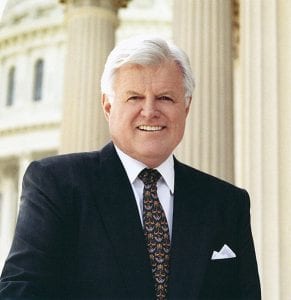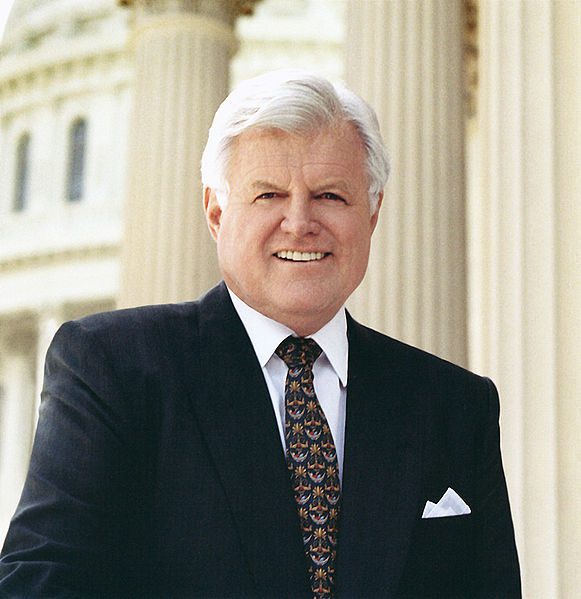
File photo
Oof—Bad sucker punch from the cosmos on Tuesday. We all saw the worrisome weekend news about Senator Edward Kennedy’s seizure, but it was followed by the more soothing follow-ups—those oh, people-often-get-seizures-and-we-just-don’t-know-why-reports, along with accounts of the senator’s good spirits as he sat up in bed and ate takeout. while watching the Red Sox game.
Then, suddenly, the news of a malignant brain tumor. Those three heart-stopping words.
The guy’s a force of nature, so it’s hard to even imagine the nerve of those malignant cells taking him on, let alone taking him down.
Such a bracing tonic to see Kennedy stand up on the Senate floor and get all red-faced and as mad as the rest of us when he tells Congress that the rush to war in Iraq was a mendacious crock of shit — my words, not Kennedy’s, that I know of, anyhow — and his, hey, Congress, when will you pass immigration reform that actually allows workers living here for years to integrate into American society?
And — still really quite broadly paraphrasing the senator’s words here — would you, Congress, FINALLY pass a miserable two-buck raise to the minimum wage after ten years? — and I’m lookin’ at YOU, bill-blocking Republicans!
Not to mention his decades-long press for health care for all.
That is all to Sen. Kennedy’s credit. I know, everybody says Ted, but never met him, can’t do it.
I will here shamelessly copy Wonkette — with all due props and praise — and link to a Wikipedia summary of his record. You’ll see he’s almost always, even if not absolutely always, on the right side of history.
Given the kind of crap and distortion history has suffered throughout the Bush Era, that’s outstanding.
It was surprising to find how personally I took the news of his grave illness. Irish-Americans can have a weird personal-feeling link to the Kennedys despite certain differences — such as they are way richer, often-better-looking, but sometimes not — and certainly better dressed than most of the rest of us stateside Irish.
Not to mention the yachting. And Harvard. But at least patriarch Joseph Kennedy is reputed to have made his fortune in rum-running, so that scuttles the snob factor.
In the Roman Catholic cathedral in Galway, Ireland, there’s a mosaic of John F. Kennedy’s profile on one side of a shining resurrected Jesus on Easter morning. The image of Pope Paul XXIII is next to Jesus on the opposite side.
Just to give you an idea about the Irish and the Kennedys:
After my granddad died, i found a deck of Kennedy cards in my grandparents’ house — not playing cards, more like trading cards — photos of Jack Kennedy and his family. I think I remember pictures of Robert in there; as a child I wouldn’t have known Edward.
A couple of years ago in a thrift store on Widbey Island in Washington State, I ran across an August 1969 edition of Time magazine with a young Edward Kennedy on the cover.
It had been published just weeks after the tragedy known as Chappaquiddick. That time-capsule find let me read about it as if it had just happened.
You doubtless know the story.
On July 18, 1969, Edward Kennedy attends a party on Chappaquiddick island in Massachusetts and later accidentally drives off a bridge with a passenger in the car. It sinks in a channel, he escapes, she drowns.
He leaves the scene — after as many as eight attempts, by his account, to dive in and get her out — and fails to contact authorities for hours.
The woman’s name was Mary Jo Kopechne. She had been a campaign worker for Robert Kennedy, who had been assassinated in Los Angeles just a year before, the night he won the California primary in the 1968 race for the U.S. presidency.
The party had been a celebration for Mary Jo Kopechne and five other campaign colleagues. Her family didn’t sue, telling the press they didn’t want it to look like they sought “blood money.”
Edward Kennedy pleaded guilty to leaving the scene of an accident, was sentenced to two months in jail, suspended, and a one-year loss of his driver’s license.
Why bring this up now? It seems ignoble in the wake of the senator’s terrible diagnosis, and in an essay where I come to praise him, not to bury him.
But I remember how reading that Time story changed my fourth-hand impressions, all based on the above-my-head conversations I had heard as a child about how his privilege got him off the hook.
And it’s hard to argue that someone in another place, with a darker skin shade, would have gotten a similar shake from the justice system.
I just remember when reading that story being so struck by the timing of the Chappaquiddick tragedy — one Kennedy brother had been murdered just 13 months prior, a scant five years after the first had been assassinated.
Not an excuse for fatally bad judgment, but circumstances that might knock my clarity out of whack if that had happened in my family.
The other thing about the 1969 article is that it made me think about the way Edward Kennedy then undertook the rest of his life to fight the fight and build the legacy we now know.
He declined to run for president in 1972 and 1976, citing his brothers’ assassinations, but ran against President Jimmy Carter in 1980’s Democratic primary, losing narrowly.
So he then went on to become the Senate’s Liberal Lion, as he has rightly been dubbed, a ferocious fighter for equity at a time when the zeitgeist increasingly demands we spurn the Not Rich as losers who deserve a fate of hand-to-mouth drudgery.
Edward Kennedy’s story smacks of the Shakespearean — a life of material privilege shattered by what many regard as a family curse, his flawed and fatal response on Chappaquiddick, then a Senate career of shrewd, tireless, and dogged work on the side of the angels.
This blog post, it’s important to point out, is far from an obit. The man was just now diagnosed and most accounts, I was happy to hear, have him barging around the hospital in brave spirits.
Something takes us all down, of course, an obvious observation that by no means counts the senator out. Edward Kennedy is only now at the beginning of this journey — I call it that rather than use the conventional term “battle.”
People always talk about “battling” cancer, but having been at the bedside of a survivor, I know that, from diagnosis on, it’s really more a trudge than a slugfest. It’s about one foot in front of the other as you do what the doctors say — even if seemingly absurd, or undignified or painful — as you hope like hell they are right.
All of which takes a lot of guts and composure and courage. And Sen. Kennedy’s got all that. So no urging for “battling: here, unless it’s back in the Senate battling The Evils.
Only an Irish toast: Slainte.
That means “health.”





Murray’s excellent post reminds us that while Ted Kennedy is often portrayed as a divisive figure, he’s actually one of the last remaining statesmen in the Senate who has a vested interest in reaching across the aisle. But more importantly, Murray’s piece points to something that is increasingly lacking in government: having personal, even sentimental ties with elected officials at the federal level. The way the Kennedy dynasty resonates with so many Americans — good or bad — is something that is fading fast in American politics.